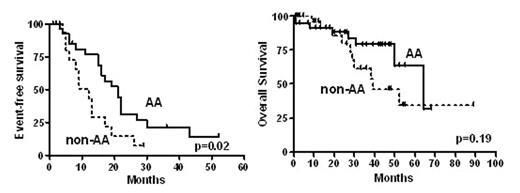Abstract
The incidence of multiple myeloma (MM) in African American (AA) patients is higher than in other racial groups. In this retrospective study we analyzed the outcome of 70 consecutive patients (AA n=38, non-AA n=32) with MM receiving an autologous stem cell transplantat (ASCT) at the University of Illinois at Chicago. No significant differences, including age, gender, stage of disease, Hgb and b2 microglobulin levels, skeletal involvement, plasma cell marrow infiltration, were observed between AA and non-AA patients at diagnosis. Chemotherapy prior to ASCT was also comparable in the two groups. Conditioning regimen with high dose melphalan was used in 84% AA and 72% non-AA, while the remaining patients received BCNU/melphalan. After induction chemotherapy no difference occurred in complete remission (CR) and partial remission (PR) rates in AA (9% and 42%) as compared to non-AA (13% and 33%). Two months after transplantation CR and PR rates were 31% and 25% in AA and 30% and 20% in non-AA. However, at 6 months after ASCT 25%AA vs 60% non-AA patients showed a progression of the disease (p=0.009). At a median follow-up of 26 months (range:1 to 89), 79% AA and 69% non-AA patients are alive. The estimated median Event-Free-Survival in the two groups is 21 vs 12 months (p=0.02), while the estimated median Overall Survival is 64 vs 39 months (p=0.19) (Figure 1). In conclusion, AA and non-AA patients have similar CR and PR rates after ASCT. However, AA patients seem to have more prolonged clinical responses. In a setting where equal access to modern modalities of treatment is available, race does not appear to affect responses to therapy in multiple myeloma.
Author notes
Corresponding author


This feature is available to Subscribers Only
Sign In or Create an Account Close Modal